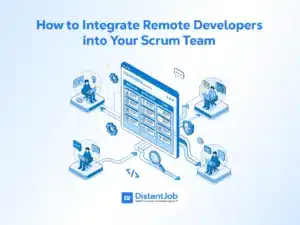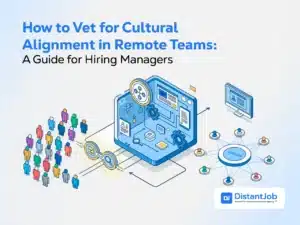Here at DistantJob, we never miss a chance to use our state-the-obvious-advantages Hypno-ray to brainwash people into taking up remote work. We promote remote work because it has all the benefits for employers and employees. We aim to bring together the very best candidates for virtual teams around the globe. We know the benefits of hiring remote employees for both employee and employer.
What happens when you want to work with a distant team, but your company hasn’t made the move to remote work yet? How can you change attitudes within your organization and free yourself up to recruit the very best people from around the world? By becoming a remote working champion.
How to Effectively Promote Remote Work Internally
1. Don’t Reinvent the Wheel
There’s a lot of great information out there that explains why letting staff work remotely is a great idea. You don’t need to spend a lot of time doing the research to make your case, much of it has already been done by organizations like 1 Million for Work Flexibility, a movement of people and organizations who believe in more flexible working, including remote work. Browse their press releases and other information to see how they make their case. Just recently, Salesforce also embraced remote work culture and that says a lot about where the now and the future of work culture is.
2. Don’t Rehash Old Arguments
Although there are a number of articles out there that sing praises of remote work, most of them focus on how working from home benefits the employee and only talk about the pros for an employer in terms of increased productivity. Chances are that whoever you’re presenting to has already seen these arguments being made, and read some of the counter-arguments too. Look for new ways to convince your managers; talk about how they could widen the talent pool or how remote employees cut running costs.
3. Don’t Ignore Criticisms
If you’re a remote work advocate, it can be tempting to only preach about the upsides and ignore the challenges, but if you want to convince people then you’re going to need to have answers to some of the common concerns about remote work. There have been some high profile failures; if you’re in a board meeting and someone says, “If Yahoo couldn’t make it work, how can we?” then what are you going to say? (Hint: They still do it.)
Think about how you’re going to measure the success of your program, how you’re going to make sure that workers (especially if they’re in different time zones) actually deliver. Don’t present an incomplete argument. Make sure that you’re really committed to making your virtual team story a success before you pitch it.
4. Consider a Pilot Program
For many companies, a pilot scheme is a way to assuage any fears there may be about remote work. Running a pilot allows you to try out the technology on a small scale, lowering costs and risks. It gives you an opportunity to come up with tactics and insights to answer some of the criticism. If you’re interested you can look at other organizations’ schemes to get a framework for your own pilot, or research the idea to come up with your own.
5. The Art of Persuasion
In his TED talk about persuasive speeches, Professor Heller talks about how pitches really have the power to sway our minds when they reach the audience on both a logical and emotional level. It’s the combination of ‘killer facts’ and making the audience feel that you are speaking directly to them that is so compelling. We’ve already covered the “facts” side of things, but how do you prepare for reaching people on an emotional level?
At its core, emotional connection comes from effective listening. If you want to show someone that you understand them, then first you have to actually understand them and that can only come from spending some time listening to their point of view. Start with criticism; if you’ve understood them then you should also be able to empathize with why someone might think or feel the way they do. That is the starting point to connect, and that leads to persuasion.
From there, it’s just about putting together a persuasive presentation, or if your meeting is less formal than knowing how best to get your information across to the person you’re talking to.
6. Jedi Mind Tricks
I have a friend who uses the Obi-Wan ‘these aren’t the droids you’re looking for’ hand-wave in business meetings and claims that it works. For those of us who haven’t mastered the ways of the force, we’re left with using tactics from psychology and Neuro Linguistic Programming to increase our chances of winning an argument.
Yes, yes, YES! – If you’ve had a phone call or been stopped in the street by a charity rep. lately, you might have noticed that they always start by asking you a question that only a monster would say no to. There’s a good psychological reason for that. If someone has previously agreed with you, they’re more likely to do it again. You’re conditioning them to say a yes.
They usually start with ‘Do you agree that child suffering is a bad thing?’ and of course, you say yes. Then it’s ‘Would you like to see all children have access to the healthcare they need?’ and again, you reply in the affirmative. That’s the point when they hit you with the request for support: ‘So, would you help us with a small donation?’ and because you’ve agreed twice already, you’re more likely to say yes to that third question. To be precise, you’ve been cornered and there’s almost no way out.
You can use this same tactic, make statements that either elicit a firm, ‘Yes’ from the person you’re talking to or make statements that they agree with before you make the ask.
One of the things… – A simple mental trick for enhancing the validity of an idea is to start sentences with the phrase, ‘One of the things…’ Why? Because our brains helpfully supply the idea that, if that’s one of the things there must be others. So, if you say, ‘One of the advantages to remote working is…’ you are subliminally communicating that there are other advantages which you haven’t mentioned.
I don’t know if you’ve noticed… In a similar vein, if you start a sentence with the words, ‘I don’t know if you’ve noticed’ it engages the listener’s attention in a different way; they listen harder. It raises curiosity to another level, leaving listeners wondering if they have noticed and suddenly they’re listening harder.
I don’t know if you’ve noticed… In a similar vein, if you start a sentence with the words, ‘I don’t know if you’ve noticed’ it engages the listener’s attention in a different way; they listen harder. It raises curiosity to another level, leaving listeners wondering if they have noticed and suddenly they’re listening harder.
Let DistantJob Promote Remote Work For You
Here at DistantJob, we have no doubt that remote working is a really great solution. If you’re looking for proof that creating a virtual team will give you access to some amazing talent, then contact us and we can help promote remote work in your organization by talking about the benefits. One of the things we excel at is matching fantastic candidates to great opportunities (do you see what I did there?) And if you’re just looking for more evidence to build your case for remote work? Keep reading this blog!




